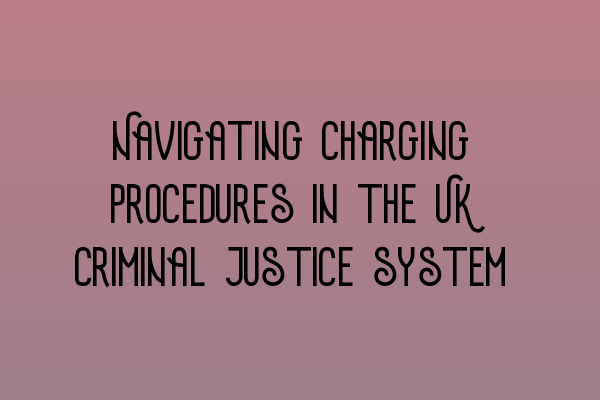Navigating Charging Procedures in the UK Criminal Justice System
Welcome to SQE Criminal Law & Practice Law UK! As leading solicitors, we understand the complexities involved in the UK criminal justice system and aim to provide you with valuable insights to navigate various legal procedures. In this blog post, we will focus on the charging procedures within the criminal justice system and provide essential information to help you better understand the process.
What are Charging Procedures?
Charging procedures play a crucial role in the criminal justice system, as they are the first step in the legal process after an alleged crime has been committed. These procedures involve a decision on whether to charge an individual with a criminal offense based on the evidence available.
In the UK, charging decisions are made by the Crown Prosecution Service (CPS), an independent organization that assesses evidence provided by the police and determines if there is sufficient evidence to support a criminal charge. The CPS follows specific guidelines outlined in the Code for Crown Prosecutors to ensure fair and consistent decision-making.
The Charging Decision
When considering a charging decision, the CPS evaluates the strength of the evidence against an individual and determines if it is in the public interest to proceed with a criminal prosecution. The CPS considers factors such as the seriousness of the offense, the impact on the victim, and any potential mitigating circumstances.
If the CPS decides not to proceed with a criminal charge, they may choose alternative courses of action, such as issuing a caution, restorative justice, or taking no further action. It’s important to note that the CPS’s decision can be reviewed if new evidence emerges or if legal advice suggests reevaluating the case.
The Charging Process
Once the CPS decides to proceed with a criminal charge, they will inform the suspect of the offense they are being charged with. The suspect will then be summoned to attend a court hearing, where they will be formally charged.
During the court hearing, the defendant will have the opportunity to enter a plea of guilty or not guilty. If they plead guilty, the case may proceed to sentencing immediately. If they plead not guilty, the case will advance to trial, where the prosecution and defense will present their respective arguments and evidence.
It’s worth mentioning that the charging process can differ depending on the nature and severity of the offense. For more information on specific procedures, we recommend checking out our related articles:
- SQE 1 Practice Exam Questions
- SQE 1 Practice Mocks FLK1 FLK2
- SQE 2 Preparation Courses
- SQE 1 Preparation Courses
- SRA SQE Exam Dates
Seek Professional Legal Advice
Understanding charging procedures is essential if you find yourself involved in the criminal justice system. However, it’s important to remember that every case is unique, and seeking professional legal advice is crucial to protect your rights and interests.
At SQE Criminal Law & Practice Law UK, our team of expert solicitors specializes in criminal law and can provide the guidance and representation you need throughout the legal process. Whether you are facing criminal charges or require legal assistance in defending your rights, we are here to support you.
We hope this blog post has shed some light on the intricacies of charging procedures in the UK criminal justice system. If you have any further questions or need personalized legal advice, please do not hesitate to contact us. Our dedicated team is ready to assist you.
Stay informed by visiting our website for more valuable information on various legal topics.
